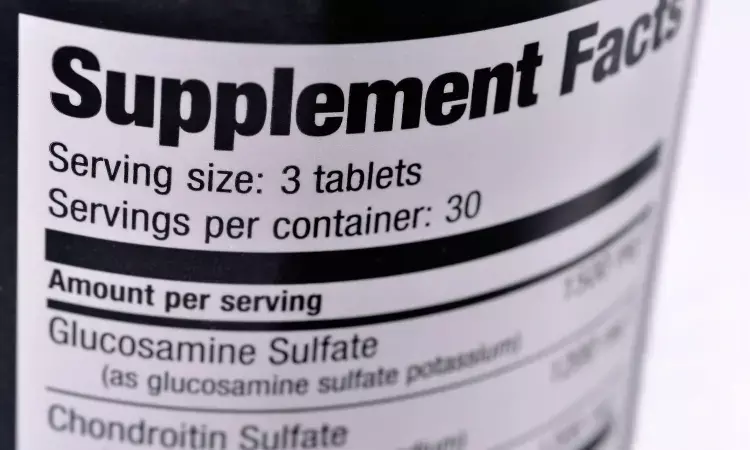- Home
- Medical news & Guidelines
- Anesthesiology
- Cardiology and CTVS
- Critical Care
- Dentistry
- Dermatology
- Diabetes and Endocrinology
- ENT
- Gastroenterology
- Medicine
- Nephrology
- Neurology
- Obstretics-Gynaecology
- Oncology
- Ophthalmology
- Orthopaedics
- Pediatrics-Neonatology
- Psychiatry
- Pulmonology
- Radiology
- Surgery
- Urology
- Laboratory Medicine
- Diet
- Nursing
- Paramedical
- Physiotherapy
- Health news
- Fact Check
- Bone Health Fact Check
- Brain Health Fact Check
- Cancer Related Fact Check
- Child Care Fact Check
- Dental and oral health fact check
- Diabetes and metabolic health fact check
- Diet and Nutrition Fact Check
- Eye and ENT Care Fact Check
- Fitness fact check
- Gut health fact check
- Heart health fact check
- Kidney health fact check
- Medical education fact check
- Men's health fact check
- Respiratory fact check
- Skin and hair care fact check
- Vaccine and Immunization fact check
- Women's health fact check
- AYUSH
- State News
- Andaman and Nicobar Islands
- Andhra Pradesh
- Arunachal Pradesh
- Assam
- Bihar
- Chandigarh
- Chattisgarh
- Dadra and Nagar Haveli
- Daman and Diu
- Delhi
- Goa
- Gujarat
- Haryana
- Himachal Pradesh
- Jammu & Kashmir
- Jharkhand
- Karnataka
- Kerala
- Ladakh
- Lakshadweep
- Madhya Pradesh
- Maharashtra
- Manipur
- Meghalaya
- Mizoram
- Nagaland
- Odisha
- Puducherry
- Punjab
- Rajasthan
- Sikkim
- Tamil Nadu
- Telangana
- Tripura
- Uttar Pradesh
- Uttrakhand
- West Bengal
- Medical Education
- Industry
Glucosamine supplementation may lowers risk of incident vascular dementia among elderly

Habitual supplement of glucosamine lowers the risk of incident vascular dementia. It is not tied to the risk of incident Alzheimer's disease and frontotemporal dementia, according to a recent study. In addition, this association is not modified by APOE genetic variations and baseline cognitive function.
This study, "Habitual glucosamine use, APOE genotypes, and risk of incident cause-specific dementia in the older population" by Chun Zhou is published in Alzheimer's Research & Therapy.
There is uncertainty about glucosamine usage and incident dementia in the older population. In this study of 214,945 participants over 60, researchers evaluated the longitudinal association between habitual glucosamine supplements and the risk of cause-specific dementia. They examined the possible effect modifiers on this association. The information was available on glucosamine use. The participants did not have dementia at baseline in the UK Biobank. A combination variant of rs429358 and rs7412 determined the APOE genotypes.
The primary outcome measured in the study was incident vascular dementia, incident Alzheimer's disease, and incident frontotemporal dementia, respectively.
The key results of the study are:
- The median follow-up duration was 12 years.
- In this follow-up duration, vascular dementia, Alzheimer's disease, and frontotemporal dementia were developed in 1039, 1774, and 122 participants, respectively.
- Habitual glucosamine use lowered the risk of incident vascular dementia with an adjusted HR of 0.82.
- This had no association with incident Alzheimer's disease and frontotemporal dementia, with adjusted HR of 1.02 and 0.95, respectively.
- Those with concomitant calcium supplementation and those without concomitant zinc supplementation had an inverse association between habitual glucosamine use and incident vascular dementia.
- APOE ε4 dosage and baseline cognitive function did not modify the relationships of glucosamine use with incident vascular dementia or Alzheimer's disease
They concluded that regardless of APOE genotypes and baseline cognitive function, habitual glucosamine has an inverse association with incident vascular dementia in the older population.
Further reading:
https://alzres.biomedcentral.com/articles/10.1186/s13195-023-01295-6
BDS, MDS in Periodontics and Implantology
Dr. Aditi Yadav is a BDS, MDS in Periodontics and Implantology. She has a clinical experience of 5 years as a laser dental surgeon. She also has a Diploma in clinical research and pharmacovigilance and is a Certified data scientist. She is currently working as a content developer in e-health services. Dr. Yadav has a keen interest in Medical Journalism and is actively involved in Medical Research writing.
Dr Kamal Kant Kohli-MBBS, DTCD- a chest specialist with more than 30 years of practice and a flair for writing clinical articles, Dr Kamal Kant Kohli joined Medical Dialogues as a Chief Editor of Medical News. Besides writing articles, as an editor, he proofreads and verifies all the medical content published on Medical Dialogues including those coming from journals, studies,medical conferences,guidelines etc. Email: drkohli@medicaldialogues.in. Contact no. 011-43720751


